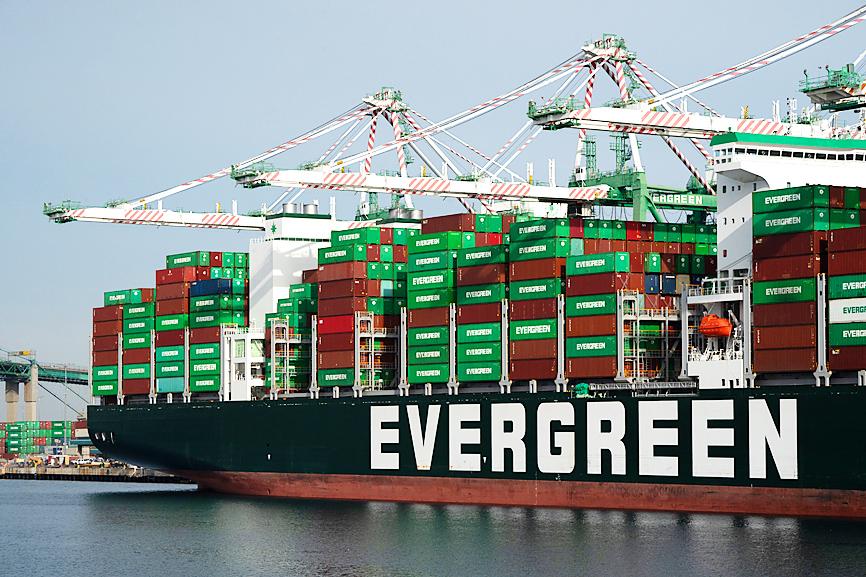Taiwan’s export orders totaled a record US$57.78 billion last month, up 12 percent month-on-month and 29.7 percent year-on-year, the Ministry of Economic Affairs said yesterday.
The better-than-expected results were boosted by “a certain recently released smartphone product by an international company,” Department of Statistics Director Huang Yu-ling (黃于玲) told a news conference in Taipei.
Apple Inc, which used to release its new iPhone models in September, delayed this year’s launch to Oct. 23 due to production disruptions caused by the COVID-19 pandemic.

Photo: Bloomberg
“We can’t give exact figures, but it’s quite clear that the smartphone launch in question has had a very substantial effect,” Huang said. “It partially explains why 59.2 percent of the goods supplied by Taiwanese exporters were manufactured abroad,” up 3.3 percentage points year-on-year.
The trend of local manufacturers moving their production back home is “here to stay,” but iPhones are mostly made by Taiwanese contract manufacturers in China, she said.
Export orders for information and communication technology (ICT) products hit a record high of US$20.82 billion, up 39.4 percent year-on-year, on the back of seasonal demand for laptops and tablets, as well as the iPhone launch, Huang said.
Orders for electronic products also set a record of US$17.19 billion, up 37.8 percent year-on-year, while optical product orders were US$2.37 billion, up 27.8 percent year-on-year, ministry data showed.
Non-tech industries also posted growth in orders last month, with plastic product orders increasing 20 percent year-on-year to US$2.14 billion, basic metal orders advancing 25.2 percent to US$2.43 billion and mechanical products climbing 11.5 percent to US$1.86 billion.
Only orders for chemical products dipped on depressed international oil prices, falling 4.4 percent to US$1.53 billion, the data showed.
The US accounted for US$18.13 billion of all export orders, up 30.6 percent annually, while US$12.83 billion of orders came from China and Hong Kong, up 23.3 percent, and US$14.39 billion of orders came from Europe, up 50.2 percent.
In the first 11 months of this year, total export orders increased 7.3 percent year-on-year to US$473.11 billion, the ministry said.
Export orders are forecast to total US$56.5 billion to NT$58 billion next month, which would translate into a 2.2 percent monthly decline and a 29 percent annual increase on the low end of the estimate, and a 0.4 percent monthly increase and a 32.5 percent annual increase on the high end, the ministry said.
This means for the whole year estimated export orders would be US$529.7 billion to US$531.1 billion, or annual growth of 9.3 to 9.6 percent, the ministry said.
“While this rate of growth in export orders is not exactly historic, it is remarkable that we are able to accomplish this in a pandemic year,” Huang said.

Nvidia Corp chief executive officer Jensen Huang (黃仁勳) on Monday introduced the company’s latest supercomputer platform, featuring six new chips made by Taiwan Semiconductor Manufacturing Co (TSMC, 台積電), saying that it is now “in full production.” “If Vera Rubin is going to be in time for this year, it must be in production by now, and so, today I can tell you that Vera Rubin is in full production,” Huang said during his keynote speech at CES in Las Vegas. The rollout of six concurrent chips for Vera Rubin — the company’s next-generation artificial intelligence (AI) computing platform — marks a strategic

REVENUE PERFORMANCE: Cloud and network products, and electronic components saw strong increases, while smart consumer electronics and computing products fell Hon Hai Precision Industry Co (鴻海精密) yesterday posted 26.51 percent quarterly growth in revenue for last quarter to NT$2.6 trillion (US$82.44 billion), the strongest on record for the period and above expectations, but the company forecast a slight revenue dip this quarter due to seasonal factors. On an annual basis, revenue last quarter grew 22.07 percent, the company said. Analysts on average estimated about NT$2.4 trillion increase. Hon Hai, which assembles servers for Nvidia Corp and iPhones for Apple Inc, is expanding its capacity in the US, adding artificial intelligence (AI) server production in Wisconsin and Texas, where it operates established campuses. This

Garment maker Makalot Industrial Co (聚陽) yesterday reported lower-than-expected fourth-quarter revenue of NT$7.93 billion (US$251.44 million), down 9.48 percent from NT$8.76 billion a year earlier. On a quarterly basis, revenue fell 10.83 percent from NT$8.89 billion, company data showed. The figure was also lower than market expectations of NT$8.05 billion, according to data compiled by Yuanta Securities Investment and Consulting Co (元大投顧), which had projected NT$8.22 billion. Makalot’s revenue this quarter would likely increase by a mid-teens percentage as the industry is entering its high season, Yuanta said. Overall, Makalot’s revenue last year totaled NT$34.43 billion, down 3.08 percent from its record NT$35.52

PRECEDENTED TIMES: In news that surely does not shock, AI and tech exports drove a banner for exports last year as Taiwan’s economic growth experienced a flood tide Taiwan’s exports delivered a blockbuster finish to last year with last month’s shipments rising at the second-highest pace on record as demand for artificial intelligence (AI) hardware and advanced computing remained strong, the Ministry of Finance said yesterday. Exports surged 43.4 percent from a year earlier to US$62.48 billion last month, extending growth to 26 consecutive months. Imports climbed 14.9 percent to US$43.04 billion, the second-highest monthly level historically, resulting in a trade surplus of US$19.43 billion — more than double that of the year before. Department of Statistics Director-General Beatrice Tsai (蔡美娜) described the performance as “surprisingly outstanding,” forecasting export growth